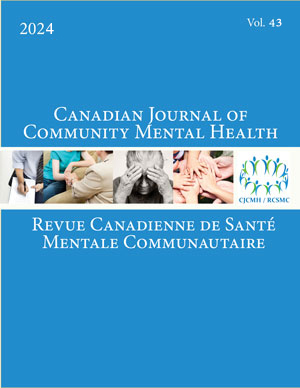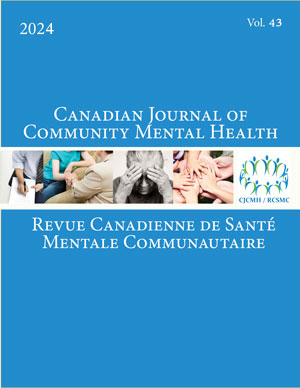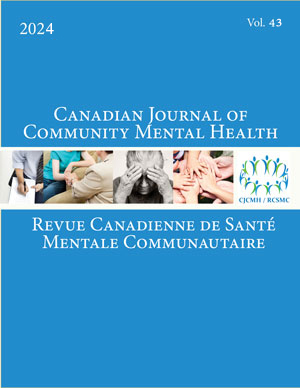Volume 36 • Number 4 • December 2017
Responses to the Mental Health Strategy for Canada: Canadian and International Perspectives on Mobilizing Change (Part 2)
Foreword
Articles
OPEN ACCESS
The concept of “community” is ubiquitous in mental health policy, research, and practice in Canada; however, its meaning is rarely defined. In this paper, we consider the positioning of “community” within the Canadian historical and political mental health context and reveal that it contrasts with the lived experiences of people with psychiatric disabilities. We argue that mental health policy, research, and practice should move away from the term community in favour of a framework that addresses basic needs, disability justice, intersecting social identities, and the structural forces that impact the lives of people with psychiatric disabilities as they “recover” in settings outside of hospital.
OPEN ACCESS
For 20 years mental health and primary care providers across Canada have been working collaboratively together to improve access to care, provider skills, and patient experience. The new strategic plan of the Mental Health Commission of Canada (MHCC) offers many opportunities for collaborative care to play a role in the transformation of Canada’s mental health systems. To assist the plan, this paper presents principles underlying successful projects and ways that mental health and primary care services can work together more collaboratively, including integrating mental health providers in primary care. It integrates these concepts into a Canadian Model for Collaborative Mental Health Care that can guide future expansion of these approaches, and suggests ways in which better collaboration can address wider issues facing all of Canada’s health care systems.
OPEN ACCESS
It is the current authors’ perspective that the successful implementation of Changing Directions, Changing Lives, which seeks to improve mental health and well-being in Canada, cannot be realized effectively without considering FASD. Given that 94% of individuals with FASD also have mental disorders, practitioners in the mental health system are encountering these individuals every day. Most mental health professionals have not been trained to identify or diagnose FASD, and therefore it goes largely “unseen,” and individual treatment plans lack efficacy. Implementation of FASD-informed recommendations, such as those of the Truth and Reconciliation Commission of Canada (2015), can provide a more effective approach to mental health services and improve mental health outcomes.
OPEN ACCESS
Cultural competence has proven to be a very efficient tool in reducing healthcare disparities and improving healthcare experiences, compliance with therapy, and reducing incidents of misdiagnosis. This effect is because professionals are recognizing the value and significance of including the person in need of services in their assessment and decision making. While this rationale has also long been considered part of good practice among healthcare professionals (providers) within the mental health arena and nursing care and the success of its use has been reported widely in the provider and insurance arena, the notion seems to have escaped the commissioning arena. Commissioners are responsible for specifying, procuring, and monitoring services and are missing out on the value of completing culturally competent needs assessments for their localities. Synonymous with cultural competence is “person-centred care.” In recent times, cultural competence has contributed much to the commissioning of dementia services in a bid to improve and promote person-centred care. It could be argued that there is no person-centred care without cultural competence, which, in simplistic terms, can be defined as care that is undertaken in partnership with the recipient and is of value and significance to the recipient. Culturally competent commissioning and provision of care is therefore to be recommended as capable of addressing quality issues and the problematic variation in services available.
OPEN ACCESS
Social and emotional learning is increasingly recognized as playing an important role in the promotion of positive mental health in schools. In 2012, the Mental Health Commission of Canada identified child and youth mental health as a priority for the transformation of mental health systems in Canada. To this end, comprehensive efforts to promote positive social and emotional development in schools and to foster safe and caring school environments are urgently needed. This paper highlights the multi-faceted approach undertaken in British Columbia over the past decade to promote positive mental health through social-emotional learning in schools.
OPEN ACCESS
In most disability income support (DIS) programs, mental illnesses is the fastest growing category of illness, but it is unknown how policy designers consider this vulnerable group. Forty-five DIS policy designers in Australia and Ontario explained how they consider mental illnesses when designing policy. Using a grounded theory approach, five challenges emerged: validating duration, proving an illness, (un)differentiating mental illnesses, managing mental illnesses, and separating the person from the illness. Each challenge is described and compared across Australia and Ontario. These challenges provide a framework for other settings to determine how well their DIS policies have considered mental illnesses in policy design.
OPEN ACCESS
Since 2000, 5 studies have been published that each purported to estimate aggregate national mental health costs in Canada. Each of these studies used a different method. Our aim was to compare the studies, and we created a framework for the different elements used to assess mental health costs (direct costs, indirect costs, transfer payments, and “human” costs). In addition, each study used different parameters (population covered, diagnosis) and cost components to estimate the economic impact of mental health. Our framework can help analysts to understand the purpose of different cost components. We conclude that to achieve a consensus on the magnitude of mental health costs, we need to use more standardized approaches.










